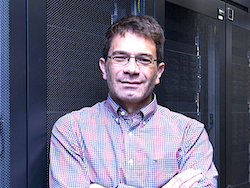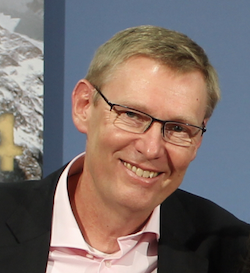"Making progress as a team"
Energy efficiency in supercomputing, new architectures and codes for high-performance computing, above all the growing needs of science and research: the Leibniz Supercomputing Centre (LRZ) does not want to and cannot solve all the questions for its future on its own and is therefore working closely with an advisory board. Prof. Dr Gerhard Wellein from the Friedrich-Alexander-Univeristät in Erlangen and Prof. Dr Stefan Dech, Director of the German Earth Observation Centre (EOC) at the German Aerospace Centre (DLR), were newly elected to this committee. The LRZ Beirat is composed of 28 members and includes representatives from the Bavarian Academy of Sciences and Humanities as well as from universities in Munich and Bavaria.
Wellein, a physicist, has been enriching the HPC community with his experience, knowledge and code optimizations for more than 20 years. The multi-award-winning scientist teaches High Performance Computing (HPC) in Erlangen, has an excellent international network, is involved in the Partnership for Advanced Computing in Europe (PRACE) and in the Bavarian competence network for scientific HPC KONWIHR. Geographer Dech also has an extensive network to offer. At EOC, he researches remote sensing data for indications of climate change and environmental changes, and also works on methods and systems for evaluating satellite data. Together with the LRZ, DLR has developed the terrabyte platform for high-performance data analysis of Earth evolution data. In this interview, the two newly elected LRZ advisory board members introduce themselves:
What would you like to achieve at the LRZ as an advisory board member?
|
Prof. Dr. Gerhard Wellein: I have known the LRZ and many of its employees in supercomputing for many years. I have come to appreciate their know-how and their high level of commitment. It is not without reason that the LRZ plays a leading role in the field of supercomputing in Europe. At the same time, it sees itself as a technology driver, as is currently the case in cloud technologies, quantum computing or artificial intelligence. In Bavaria, there are many similar or complementary activities in new computing and simulation technologies, at the same time, the need for computing power and proficient IT services is growing in many scientific fields. For many disciplines, close cooperation with IT or HPC centres will be the basis for scientific success. I would like to not only continue to support the good networking of the LRZ with Bavarian universities and scientists, but also to strengthen it in light of the many technological and scientific challenges. |
Prof. Dr. Stefan Dech: My background is in earth observation research and I can observe on a daily basis the ultra-fast changes the earth is undergoing. The LRZ can play a key role in climate and environmental research if it succeeds in lifting the enormous and rapidly growing treasure trove of satellite data for international research. I see this as a central part of my task as an advisor. It will be important to network the LRZ with the possibilities of the European and national satellite programmes, for example with the Copernicus programme of the EU and ESA. An IT infrastructure must be created that can be used by researchers securely, reliably and independently of commercial interests. |
With whom on the advisory board will you network intensively to achieve this?
|
Wellein: I'm looking forward to getting to know new and interesting research questions in the broad-based advisory board, which can benefit from the enormous dynamics in the field of IT, but also open up new horizons for us IT and HPC specialists. |
Dech: Remote sensing is highly interdisciplinary, so all the contacts on the LRZ Advisory Board are interesting for me. It will be particularly exciting when it comes to big data technologies and the connection of computer science and geosciences. One vision is to recreate a digital twin of the Earth to simulate how climate and other geo-influences affect humans. With AI methods, we can understand interrelationships that we could only dream of years ago. |
Hand on heart - is the advisory board now more of a duty or the cherry on the cake?
|
Wellein: Even if committee work is usually seen as an obligation, being on this committee is clearly the opposite. It is always a pleasure and motivation to advance something together with partners from different disciplines. |
Dech: Definitely the latter! If I saw the Advisory Board as a compulsory activity, I would be in the wrong place. As an advisor, I want to shape the future of the LRZ. If we succeed in initiating and implementing exciting ideas, then it is time well spent. Of course, it also has to be fun, but I'm very optimistic about that. |
What experience or contacts do you bring to the table?
| Wellein: I have been active myself for many years in the Bavarian Network for High Performance Computing KONWIHR and am responsible for the new Centre for National High Performance Computing in Erlangen. So, I see myself as a bridge to the Bavarian scientists as well as to the centres at German universities that cover the broad range of HPC services offered by the LRZ. |
Dech: My network in national and European Earth observation and in the geoscientific research landscape, to many Bavarian and German authorities and ministries, to the Helmholtz Association, to ESA and of course to DLR with its enormous range of research projects. |
What motivates you?
|
Wellein: The whole is more than the sum of its parts. What motivates me, is to move things forward as a team so that something new emerges. |
Dech: Definitely: to create. To create things with leverage that were not yet possible and that have a long-term effect. To do that, you have to have good ideas in your drawer at pull them out at the right time. Earth observation is currently experiencing its golden age. We are getting free data in quality and quantity that we could not have dreamed of just a few years ago. This opens up almost unlimited possibilities for analysis and, with the methods of artificial intelligence, even new possibilities for evaluation. This is an exciting upheaval. A new era has begun for us, and we must take advantage of it now! |
High-performance data platform, AI and also quantum computing, plus supporting the universities with digital studies:
many tasks ahead for the LRZ - do you have any spontaneous advice for us?
|
Wellein: The topics clearly show that "data centres" today can no longer be reduced to procurement and operation. On the contrary - they are active partners of science and can drive technological developments for researchers. The LRZ recognised this early on and is on the right track. The exchange with the advisory board is certainly very helpful in continuing on this path successfully. |
Dech: That would be presumptuous. But if a goal is clearly formulated so that it shines out of the daily tasks, there is usually a way to realise it. For me, that means using the possibilities of remote sensing to contribute to the preservation of planet Earth and people. I want to bring this fascination to the LRZ so that together we can achieve even more.
|
|
Prof. Dr. Gerhard Wellein, FAU |
Prof. Dr. Stefan Dech, DLR |


